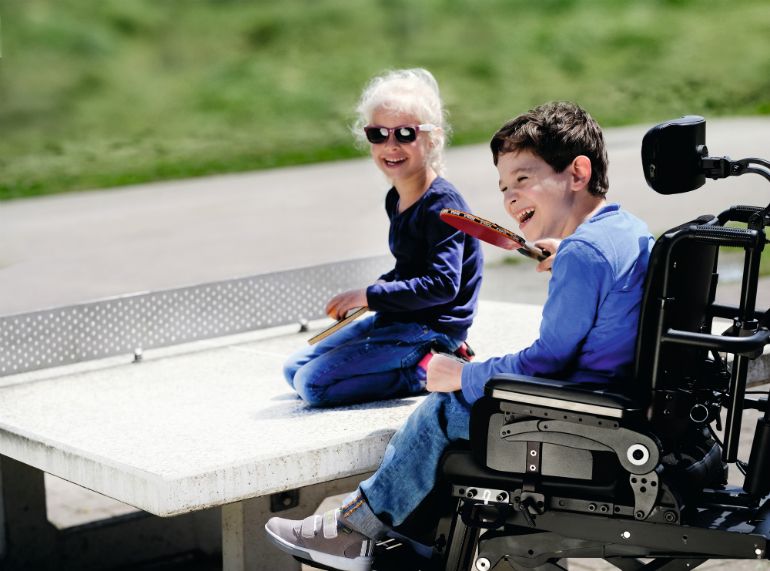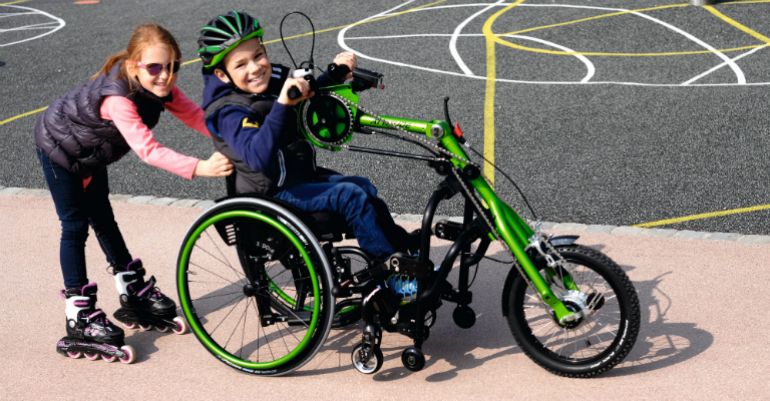Share:
Take it offline!
This Education in Motion resource is also available as a printable PDF.
Download PDF
It’s easy to understand why the prospect of raising children can seem daunting. However, if your child has a physical or mental disability, the future challenges of parenting can seem almost impossible. Although children with disabilities may require extra care and support, don’t forget that you to can seek out emotional assistance from family and friends.
Preparing in advance for a child with a disability
If your child has been diagnosed with a disability, their arrival can completely change your way of life. Although you and other family members may begin to feel stressed at the sudden changes in your routine, it is important to remember that stress in such a situation is completely normal.
Some disabilities can be identified before birth, giving you and your family some time to adjust, consult specialists and prepare your home for the new arrival. Time to adjust to the news is crucial in ensuring you are prepared to give your child the best possible start in life.
Learn as much as you can about your child’s disability
In order to ensure all of your child’s needs are being met, it is imperative that you learn everything there is to know about your child’s condition. Your doctor can help you understand what your child is experiencing and offer support and suggestions on how to improve their development and quality of life.
Not only will your doctor offer you excellent medical advice, they can also provide you with details for regional support groups, access to suitable physical therapies, and information about any government grants or provisions that may assist in the costs of additional care requirements you may need. In Australia, you can find a number of helpful articles and support services through foundations such as ‘Raising Children’ to assist you in nurturing and raising your child.
Your research should not stop after your child is born or grows older; new developments will continue to improve your child’s quality of life.

Be present during your child’s education
Your child’s education is of the utmost importance and this is no exception for children with disabilities. It is imperative that you maintain a close relationship with your child’s teachers and support staff. This will allow both you and your child’s carers to keep up to date with your child’s condition and cognitive development. This means you can create a personalised curriculum suited to your child’s social, sporting and academic abilities and requirements.
Your child’s carer’s can also help you organise for your child to join any sports teams they may be interested in, ensuring that any special requirements are accommodated for.
Spend time with other families:
Socialising is another important factor in your child’s development. There are multiple ways you can promote the development of healthy relationships between your child and their peers or siblings:
-
Organise Play Dates:
Arranging ‘play dates’ with your child’s peers will help your child develop life-long social skills as well as allow your child to develop meaningful friendships. Be sure to pay attention to which games or activities your child enjoys and which children in their class they get along with. Before arranging a long day of activities, organise short play dates to ensure your child is comfortable with the social situation.
-
Don’t be Overbearing:
Although it may be daunting allowing your child to do things on their own, it is integral that you give your child space to grow and learn, particularly as they get older. Independence is an important part of growing up for any child and a child with a disability should also be allowed this opportunity.
-
Allow Your Child to Socialise with Children of All Ages:
You should allow your child to socialise with children of all ages. While it may be nice for your child to have friends that are the same age or in the same year group, socialising with younger or older children can help them develop leadership skills, maturity and can introduce them to a variety of different interests.
-
Consider Animal Therapy:
Social anxiety is common among young children and teens, and this feeling may be exemplified in children with disabilities. Adopting a therapy pet is a great asset for developing social skills and giving your child reassurance if they are feeling overwhelmed. Not only will having a pet provide your child with a sense of responsibility and empathy, they will also develop a sense of companionship and overall happiness from the unconditional love that a pet can give.
If you do not have the room or time to adopt a pet for your child, petting zoos or children’s farms will let your child have the same experiences without any hassle. There are any number of animals that can be used as therapy pets, but dogs are usually considered the best for children. Contact organisations such as ‘Paws Pet Therapy’ if you are interested in adopting a therapy pet.

Remember that your child is truly unique
No matter what kind of disability your child has, they should never feel inadequate or unloved. Every child sometimes need a boost in self-esteem from their parents to restore their faith in themselves. This can be done by simply focusing on the positive. Always be upfront with your child about their condition, however, be sure to focus on the opportunities that are available to them and the bright future they have ahead of them.
Furthermore, ensuring your child is engaged with the community around them will make them feel more involved and included, developing a stronger sense of self value and significance. Playing in a sports team or joining a club will also cultivate camaraderie and may help your child overcome assumed limitations from their conditions.
Whether your child suffers from a physical or mental disability, it is vital that they are given the opportunity to interact with their environment and others. It’s also important they understand how amazing they are and that there is nothing stopping them from having a full life of experiences to have. Sunrise Medical hopes to improve the mobility and freedom of children with disabilities with the introduction of the new Leckey range of paediatric standers, and early intervention seating systems to making growing up easy!